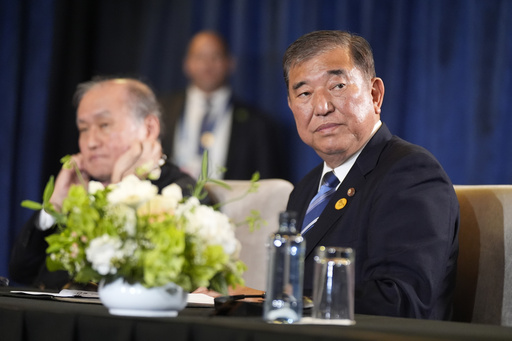
LIMA, Peru — President Joe Biden is preparing for his final conversation with Chinese leader Xi Jinping, focusing on urging Xi to persuade North Korea against increasing its assistance to Russia amidst the ongoing conflict in Ukraine.
The discussions will take place on the margins of the Asia-Pacific Economic Cooperation summit in Peru, just a couple of months before Biden transitions out of the presidency to Republican President-elect Donald Trump. This meeting is particularly significant as it marks Biden’s last engagement with Xi, a leader the Democrat has regarded as a critical counterpart on the global stage.
In this concluding communication, officials indicate that Biden aims to encourage Xi to enhance China’s involvement in preventing further escalations with North Korea, especially given the current tensions. Recently, Biden, along with South Korean President Yoon Seok Yul and Japan’s Prime Minister Shigeru Ishiba, condemned North Korean leader Kim Jong Un’s recent decision to send troops to support Russia against Ukrainian forces.
Biden described this development as “dangerous and destabilizing cooperation.” Frustrations from U.S. officials towards Beijing have surfaced, with many expressing concerns over China’s lack of action to control its neighbor, which relies heavily on China for trade.
During an intense 50-minute meeting, Biden, Yoon, and Ishiba focused on the North Korean issue, reaching a consensus that Beijing should not support such destabilizing cooperation in the region, according to a senior official who wished to remain unnamed to maintain the confidentiality of their discussion.
Reports from U.S. and South Korean intelligence suggest that North Korea has supplied Russia with artillery and munitions. Additionally, the U.S., Japan, and South Korea have voiced alarm regarding the increase in North Korean missile tests.
As the U.S. elections approached, Kim ordered drills to showcase North Korea’s capabilities to strike targets on the U.S. mainland.
The agenda for the meeting between Biden and Xi extends beyond North Korea. Discussions will encompass China’s indirect support for Russia, ongoing human rights issues, advancements in technology, and tensions surrounding Taiwan, the self-governing democracy claimed by Beijing.
There is considerable uncertainty regarding the future of U.S.-China relations under Trump, who previously indicated plans to impose significant tariffs on Chinese goods.
American companies are already adapting, with brands like Nike and Warby Parker exploring alternative sourcing options away from China. Shoe brand Steve Madden announced intentions to reduce its imports from China by nearly 45% in the coming year.
According to Victor Cha from the Center for Strategic and International Studies, Xi’s audience at the meeting will extend beyond the White House, as he will also be addressing American CEOs seeking to navigate potential investments in China amidst perceptions of a hostile business climate.
White House national security advisor Jake Sullivan emphasized that the handling of competition with China will likely be a critical foreign policy challenge for the incoming Trump administration.
Concerns persist regarding the potential for military conflict between China and Taiwan, as miscalculations could lead to severe consequences globally. Sullivan also pointed out the need for the new administration to address ongoing Chinese military aggressions against neighboring countries.
The South China Sea has seen ongoing skirmishes between the Philippine and Chinese coast guards, with frequent maneuvers by Chinese vessels near disputed territories in the East China Sea.
Following a meeting with Xi, Ishiba expressed his deep concerns regarding the situation in the East China Sea and the escalating activities of the Chinese military.
The White House has been coordinating for months to secure Saturday’s meeting, which holds significant importance for Biden before his departure from office.
Sullivan made a trip to Beijing in late August for discussions, including a sit-down with Xi, resulting in Beijing’s agreement to the meeting earlier in the week.
This represents a pivotal moment for Biden as he concludes over five decades in politics, highlighting his perception of Xi as a key player on the global front.
Biden and Xi developed their rapport years ago during their vice-presidential tenures when they had opportunities to interact within the U.S. and China, creating a bond that both leaders have acknowledged as impactful.
Nonetheless, the last four years have been marked by ongoing challenges, including revelations from the FBI regarding Chinese cyber-espionage attempts aimed at penetrating U.S. telecommunications networks, underlying a relentless campaign to gather intelligence on Americans in government.
U.S. intelligence has also noted a marked increase in Chinese exports to Russia, comprising machinery and technology critical for Russia’s military operations in Ukraine. Tensions heightened last year when Biden authorized the downing of a Chinese surveillance balloon that traversed U.S. airspace.
